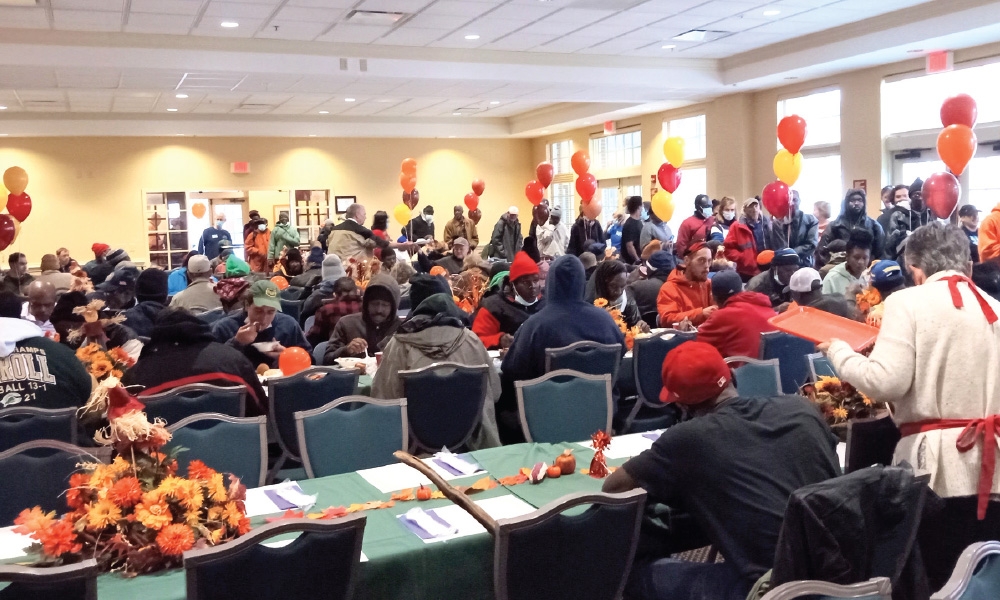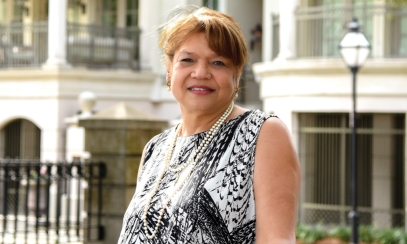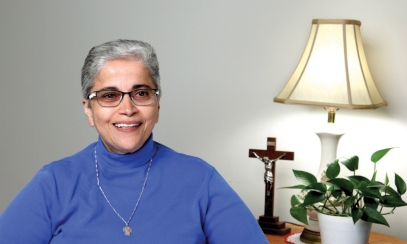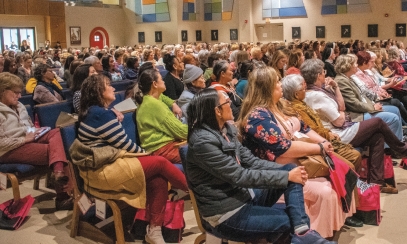
The Corporal Works of Mercy are at Work in Our Parishes and Communities
Fallout from the COVID-19 pandemic has caused a homeless crisis across this country. One bad break can devastate those living on the edge, forcing them to confront a dismal future with hope diminishing and quickly going dark. People have lost their jobs; families have been thrown out on the streets; many are dirty and ragged; many more are starving.
Fallout from the COVID-19 pandemic has caused a homeless crisis across this country. One bad break can devastate those living on the edge, forcing them to confront a dismal future with hope diminishing and quickly going dark. People have lost their jobs; families have been thrown out on the streets; many are dirty and ragged; many more are starving.
It’s no longer unusual to see folks in need walking into church parking lots with hollow eyes and begging for a chance to carry on with some kind of dignity.
This is a time for parishes across South Carolina to dig deep and serve. Jesus demands it in Matthew 25 — feed the hungry, give the thirsty a drink, clothe the naked and shelter the homeless. Those are four of the seven Corporal Works of Mercy, and it’s a beautiful thing to see the Church step up, reach out and embrace them.
St. Vincent de Paul (SVDP) societies do wonderful work across the state. So does Catholic Charities of South Carolina (CCSC). Both organizations rely in some way on funding from generous parishioners.
Mary Frei, an administrative assistant at St. Mary Help of Christians Church in Aiken, said the parish refers those in dire straits to their SVDP. All it takes is an appointment to determine their needs, she said.
“They help them with food and utilities,” Frei said. “We also refer them to the Salvation Army.”
If more is required, St. Mary calls in its partners in Area Churches Together Serving (ACTS).
“They would have a few more connections and resources,” including clothing and food, she said.
It is truly a community effort, and even the youth ministry at St. Mary gets involved, stepping up when called to provide lunch for the homeless.
Dan Dunn said SVDP societies can be found across the Upstate, Midlands and Coastal regions of South Carolina. He serves people in the area of St. Philip Neri Church in Fort Mill.
“We can offer them three nights at a local hotel, the Clarion Hotel, near Carowinds,” Dunn said of those on the streets. “If they are willing to visit with one of us, I’ll pay for the rest of the week. We are a short-term fix. We get them under a roof for a few days.”
If they require something longer term, Dunn said that he will refer them to Pathways Community Center, which connects people with the resources they need.
“They are a one-stop shop. They are good at matching people with places,” he added.
Dunn also said that his chapter refers people to the Fort Mill Care Center, which provides assistance with food, fuel, power, heat and medicine. St. Vincent de Paul also will send those who are struggling to Pilgrim’s Inn, which offers emergency assistance, food, clothing, household supplies and limited financial aid on a case-by-case basis.
“Most of the time, we help people pay their bills,” he said. “We help them get over the hump. That’s 90 percent of what we do,” and he credits the generosity of St. Philip Neri parishioners. “It seems our treasury gets replenished every month.”
CCSC also runs on the generosity of parishes across the state.
At St. Thomas the Apostle Church in North Charleston, secretary Gloria Rios said the parish sends those who need assistance to the local Catholic Charities office that serves James Island, Mount Pleasant, Charleston, Moncks Corner, Summerville, North Charleston and Hanahan.
It’s a large area, but CCSC is up to the task, according to Linda Novello, who works in the Coastal Office.
“We have a food pantry and a clothing closet where they can shop,” Novello said. The food pantry stocks meats, vegetables and dried goods, she said. “Organizations also donate pastries and fresh breads,” she added, along with fresh produce provided by farmers and grocery stores.
And she is proud of the clothing closet that just opened, saying the response has been marvelous.
CCSC volunteers also recommend homeless shelters where they can find a temporary place to stay. In the end, “you’ve got to give them dignity,” Novello said.
One program that goes a long way in providing dignity is Clean of Heart in Columbia and Greenville. It offers those who have nowhere else to turn to a place to shower and wash their laundry. Clean clothes and fresh skin will boost anybody’s spirits, and so will a meal.
Vernetta Garcia with St. Martin de Porres Church in Columbia said they “offer a soup kitchen on Sundays. Several parishes assist with that,” including Our Lady of the Hills and Transfiguration.
Garcia said St. Martin passes the collection basket a few times each year specifically to fund the soup kitchen and pay electric or water bills.
“It’s usually on a case-by-case basis,” she said of the help they offer with utility expenses.
At the Spartanburg Soup Kitchen, all who need a hot meal are welcome, according to Lou Sartor, the director, and the soup kitchen goes beyond a hot lunch; it also offers clothing and sometimes fuel cards.
Sartor recalls several times when people needing a meal drove to the soup kitchen on fumes and then could not get home. Fuel cards are a big help, she said, and so are the volunteers.
They work on the front lines. They see how one unexpected issue can cause a family to fall, and the group wants to do something about it. They want to serve. They are following Christ’s call when a crisis hits to feed the hungry, give drink to the thirsty, clothe the naked and shelter the homeless.
LEARN MORE
These are just some of the resources offered or spearheaded by Catholics across the state. Ask your parish what resources are in the area, so you have a ready answer to: “Do you know where I can get some help?”
Joseph Reistroffer is a long-time writer who teaches religious education classes at St. Paul the Apostle Church in Spartanburg. Email him at jrjoeyr@gmail.com.



